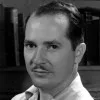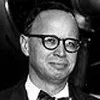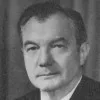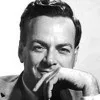Vehemence is the expression of a blind effort to support and uphold something that can never stand on its own — something rootless, incoherent, and incomplete. Whether it is our own meaningless self we are upholding or some doctrine devoid of evidence, we can do it only in a frenzy of faith.
Eric Hoffer (1902-1983) American writer, philosopher, longshoreman
Passionate State of Mind, Aphorism 60 (1955)
(Source)
Quotations about:
true believer
Note not all quotations have been tagged, so Search may find additional quotes on this topic.
I once heard an orthodox person denouncing those who discuss articles of faith. “Gentlemen,” he said naïvely, “a true Christian does not examine what he is ordered to believe. Dogma is like a bitter pill: if you chew it, you will never be able to swallow it.”
[J’ai entendu un dévot, parlant contre des gens qui discutent des articles de foi, dire naïvement: «Messieurs, un vrai chrétien n’examine point ce qu’on lui ordonne de croire. Tenez, il en est de cela comme d’une pillule amère, si vous la mâchez, jamais vous ne pourrez l’avaler.»]
Nicolas Chamfort (1741-1794) French writer, epigrammist (b. Nicolas-Sébastien Roch)
Products of Perfected Civilization [Produits de la Civilisation Perfectionnée], Part 2 “Characters and Anecdotes [Caractères et Anecdotes],” ¶ 1148 (1795) [tr. Hutchinson (1902)]
(Source)
(Source (French)). Alternate translations:I heard one day a devotee, speaking against people who discuss articles of faith, say naivement: "Gentlemen, a true Christian never examines what he is ordered to believe. It is with that as with a bitter pill; if you chew it you will never be able to swallow it."
[tr. Mathews (1878)]I once heard a pious person say naively, in arguing with people who were discussing articles of faith, "Sirs, a true Christian does not examine what he is instructed to believe. You see, it's like a bitter pill -- if you chew it, you'll never be able to swallow it."
[tr. Dusinberre (1992), ¶1148]A devout and naïve Christian was admonishing those who questioned the articles of faith. "A true Christian must never examine the things he's told to believe, gentlemen," he said. "It's like taking a pill: if you chew it, it's so bitter you'll never get it down."
[tr. Parmée (2003), ¶363]
Learn a little of anything, and you’re ready to proselytize.
Mignon McLaughlin (1913-1983) American journalist and author
The Neurotic’s Notebook, ch. 7 (1963)
(Source)
Profound ignorance makes a man dogmatical; he who knows nothing thinks he can teach others what he just now has learned himself.
[C’est la profonde ignorance qui inspire le ton dogmatique. Celui qui ne sait rien croit enseigner aux autres ce qu’il vient d’apprendre lui-même.]
Jean de La Bruyère (1645-1696) French essayist, moralist
The Characters [Les Caractères], ch. 5 “Of Society and Conversation [De la Société et de la Conversation],” § 76 (5.76) (1688) [tr. Van Laun (1885)]
(Source)
(Source (French)). Alternate translations:Profound Ignorance makes a Man dogmatick. If he knows nothing, he thinks he can teach others what he is to learn himself.
[Bullord ed. (1696)]Profound Ignorance makes a Man dogmatick; he who knows nothing, thinks he can teach others what he just now has learn'd himself.
[Curll ed. (1713)]A dogmatic tone is generally inspired by abysmal ignorance. The man who knows nothing thinks he is informing others of something which he has that moment learnt.
[tr. Stewart (1970)]
And that this is the Case very often, we may observe from the Behaviour of some of the most zealous for Orthodoxy, who have often great Friendships and Intimacies with vicious immoral Men, provided they do but agree with them in the same Scheme of Belief.
Joseph Addison (1672-1719) English essayist, poet, statesman
Essay (1711-10-02), The Spectator, No. 185
(Source)
It is a truism that almost any sect, cult, or religion will legislate its creed into law if it acquires the political power to do so, and will follow it by suppressing opposition, subverting all education to seize early the minds of the young, and by killing, locking up, or driving underground all heretics. This is equally true whether the faith is Communism or Holy-Rollerism; indeed it is the bounden duty of the faithful to do so. The custodians of the True Faith cannot logically admit tolerance of heresy to be a virtue.
Robert A. Heinlein (1907-1988) American writer
“Concerning Stories Never Written” (Oct 1952)
(Source)
Though I’ve never understood how God could expect his creatures to pick the one true religion by faith — it strikes me as a sloppy way to run a universe.
Robert A. Heinlein (1907-1988) American writer
Stranger in a Strange Land, ch. 13 [Jubal] (1961)
(Source)
In the "original uncut" edition (1960, published 1991), this is given as: "I've never been able to understand 'faith' myself, nor to see how a just God could expect his creatures to pick the one true religion out of an infinitude of false ones -- by faith alone. It strikes me as a sloppy way to run an organization, whether a universe or a smaller one."
The presence of those seeking the truth is infinitely to be preferred to the presence of those who think they’ve found it.
Sorry? Of course he was sorry. People were always sorry. Sorry they had done what they had done, sorry they were doing what they were doing, sorry they were going to do what they were going to do; but they still did whatever it was. The sorrow never stopped them; it just made them feel better. And so the sorrow never stopped. Fate, I’m sick of it all. […]
Sorrow be damned, and all your plans. Fuck the faithful, fuck the committed, the dedicated, the true believers; fuck all the sure and certain people prepared to maim and kill whoever got in their way; fuck every cause that ended in murder and a child screaming.Iain Banks (1954-2013) Scottish author
Against a Dark Background, ch. 24 “Fall into the Sea” (1993)
(Source)
Often paraphrased as "Fuck every cause that ends in murder and children crying."
It is this belief in absolutes, I would hazard, that is the great enemy today of the life of the mind. This may seem a rash proposition. The fashion of the time is to denounce relativism as the root of all evil. But history suggests that the damage done to humanity by the relativist is far less than the damage done by the absolutist — by the fellow who, as Mr. Dooley once put it, “does what he thinks th’ Lord wud do if He only knew th’ facts in th’ case.”
But we must not forget that in our country are evangelists and zealots of many different political, economic and religious persuasions whose fanatical conviction is that all thought is divinely classified into two kinds — that which is their own and that which is false and dangerous. Communists are not the only faction which would put us all in mental straitjackets.
Robert H. Jackson (1892-1954) US Supreme Court Justice (1941-54), lawyer, jurist, politician
American Communications Association v. Douds, 339 U.S. 382, 438 (1950) [concurrence and dissent]
(Source)
Those who have not lost the ability to recognize that which is laughable in themselves, or their own nothingness, are not arrogant, nor are they enemies of an Open Society. Its enemy is a person with a fiercely serious countenance and burning eyes.
Václav Havel (1936-2011) Czech playwright, essayist, dissident, politician
Speech, accepting the “Open Society” Prize, Central European University (24 Jun 1999)
(Source)
I have argued flying saucers with lots of people. … I was interested in this: they keep arguing that it is possible. And that’s true. It is possible. They do not appreciate that the problem is not to demonstrate whether it’s possible or not, but whether it’s going on or not. Whether it’s probably occurring or not, not whether it could occur.
Doubt is not a pleasant condition, but certainty is an absurd one.
[Le doute n’est pas une état bien agréable, mais l’assurance est un état ridicule.]
Voltaire (1694-1778) French writer [pseud. of Francois-Marie Arouet]
Letter (1770-11-28) to Frederick William, Prince of Prussia [tr. Tallentyre (1919)]
(Source)
The French is sometimes given (e.g.) as "Le doute n'est pas une condition agréable, mais la certitude est absurde."
(Source (French)). Alternate translations:Doubt is not a very agreeable state, but certainty is a ridiculous one.
[tr. Robertson (1922)]Doubt is not a pleasant condition, but certainty is absurd.
[E.g. (1994)]Doubt is not an agreeable condition, but certainty is an absurd one.
[E.g.]
Everyone should be prepared at times to re-examine the foundations of their beliefs, to view the world from others’ perspectives, and to seriously consider the possibility that what they accept as the Absolute Truth may, in fact, not be true at all — except me, of course, because I know I’m right.
















